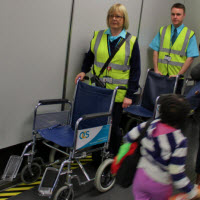 Air travel can be difficult for people with disabilities, but most airports offer special assistance to passengers requiring help to make it through their journey. However, there are many factors that affect the quality of assistance for disabled travelers at an airport.
Air travel can be difficult for people with disabilities, but most airports offer special assistance to passengers requiring help to make it through their journey. However, there are many factors that affect the quality of assistance for disabled travelers at an airport.
Airports have always focused on giving great customer service, but I learned that what makes them special is the perception they give of assistance rather than the service itself. The human element is what makes this equation work.
Let me use the following example: Passenger White will be traveling from Northern Europe to the South of the continent. At the point of departure, everything is state-of-the-art. The airport wheelchair is brand new and comfortable, and he is taken to the gate on time and pre-boarded. However, the airport agent escorting him seemed detached, borderline robotic. Interaction between the agent and Mr. White was minimal.
When Mr. White arrived at his destination, he was warmly greeted by the airport agent who gave him the impression that he genuinely cared about his well-being. That said, the airport wheelchair is old and has not been maintained in a while. The agent was aware that the airport is not fully accessible, so they had to ask for two service elevators to take Mr. White to the meeting point.
After his trip, Mr. White was interviewed and he pointed out that, in his opinion, the airport of arrival provided the best assistance. Mr. White had a generally positive reaction to the service at both airports but said that the human connection was a defining part of how he viewed it.
Analysis of Mr. White's feedback gives a clear indication as to which area airports should focus their attention and investment. Airport assistance is a critical mission that ensures air travel is inclusive. This can only be achieved by having the right members of staff working in the airport.
A couple of years ago, I was visiting the Special Assistance Division of a major airport in Northern Europe and I had the opportunity to speak with a manager in charge. She shared that their first point of recruitment was within their own existing workforce. Being naturally inquisitive, I had to ask why.
She kindly said that the H.R. department knew how caring and passionate their staff was about helping others, so they were promoting job openings for existing employees to save time and ensure that their suitability for this service was already known to their company.
Another airport in central Europe has a slightly different, yet still effective approach to recruitment of special assistance staff as they advertise temporary and part-time job openings to stagists and graduates from the care sector. This provides them with a broad range of possible employees that can be invaluable in many situations. In this scenario, the training of newly hired employees is also shorter as they are already knowledgeable in areas such as manual handling, manual lifting, and response to emergency situations.
Over time, I kept a close eye on feedback from these two airports and must say that management efforts to recruit employees in this innovative fashion did pay off. Passengers who require additional support in these two airports rate the quality of service significantly higher than passengers elsewhere across the continent.
Quite clearly, there is much more to the recruitment process that needs to be considered in order for it to work effectively. As such, I am available to discuss this in-depth with airports and service providers who are keen to make their recruitment process work more effectively.
Going forward, technology will prove instrumental in helping persons with disabilities retain their independence during their airport journey - but for those who will require additional support, having the right employees on hand will truly make a world of difference.
 Air travel can be difficult for people with disabilities, but most airports offer special assistance to passengers requiring help to make it through their journey. However, there are many factors that affect the quality of assistance for disabled travelers at an airport.
Air travel can be difficult for people with disabilities, but most airports offer special assistance to passengers requiring help to make it through their journey. However, there are many factors that affect the quality of assistance for disabled travelers at an airport.









